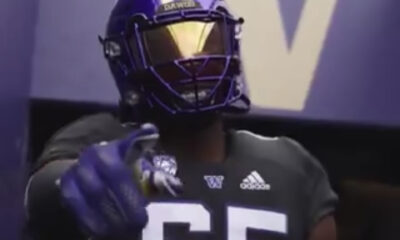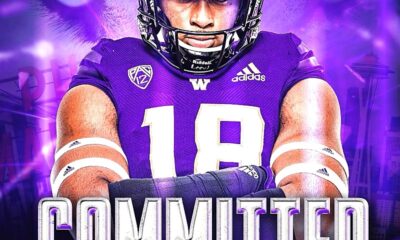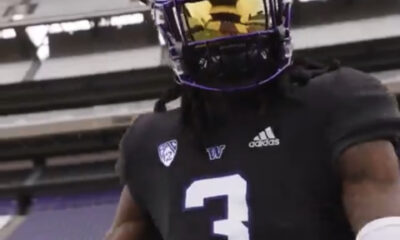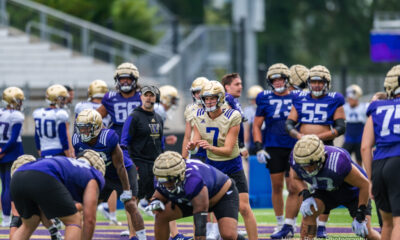On March 26th, 2006, Twitter was created by a group of guys out of Northern California and was released in July of that year.
The social networking platform has offered so many good things for growing businesses, personal brands, marketing, engagement, and a plethora of other positive uses. It has been a terrific tool for billions of users.
However, like any tool — it has been used to cause harm as well.
Every year college football fans all over the country have become more and more emboldened in their “fanatical” engagements with prospective student athletes on Twitter.
Honestly, does anyone really believe that a young person will pick a college based on what a fan says on Twitter? Just because a fan tweets to him and says “We need you at (insert school)”, or “You will look great in a (insert school colors) uniform!”.
It doesn’t stop there. If kids do wind up at a fan’s favorite school, they’ve also have been known to tell a player to go “kill himself” because he has a bad game and his team loses (one player from a Pac-12 school actually had to pull his Twitter account down because fans were so viciously attacking him on his feed after a loss in a bowl game, it was his school’s own fans).
First, they “love you” and “got your back”, then they hate you and want you to die in a fire because you didn’t do what they wanted you to do.
This is the dichotomy, or to be more exact, schizophrenia of college football fans on social media — and it’s getting worse every year.
One fan tweeted to a player to come to his school or he’d kill himself.
It’s not unique to the West Coast, Pac-12, or any one college fan base. It’s country-wide; all schools, all conferences, all divisions, and has even trickled down to high school fans.
What’s next? Pee Wee football?
Most of those abusing a social media platform that was meant for something good are grown adults who should know better. And there have even been cautionary tales and direct instructions from the school’s athletic departments.
There is, after all, this little item that most keep forgetting about from the NCAA:
“Boosters are not permitted to contact prospective student athletes through any medium of social media, such as Facebook, message boards, chat rooms, or Twitter.”
There’s also a few best-practices for social media that most schools have sent out to their booster clubs:
Boosters may utilize social media for the following activities:
*Boosters can notify coaching staff members about noteworthy prospects in the area.
*Boosters can speak with a prospect only if the prospect initiates the conversation and the conversation is
not related to athletics. Questions about athletics should be referred to a member of the coaching staff.
*Boosters can follow a prospect on Twitter.
*Booster groups can create fan/support pages for athletic programs.
However, boosters may not utilize social media for the following activities:
*Tweeting at or writing a wall post on a prospect’s profile or commenting on a prospect’s photo
*Re-tweeting a prospect or mentioning him/her in a tweet.
*Sending messages through the Facebook message or Twitter direct message functions.
*Creating a fan group that is aimed at enticing a prospect to commit to any school.
*Instant messaging (or Facebook chat) with a prospect.
Who is a “booster” then?
Traditionally, a booster is defined as someone who has made any kind of donation to an athletic program; season-ticket holders, etc.
However, on Twitter, people can be anonymous and use names that don’t reveal if they’re actually a booster or not.
SBNation even published an article teaching users how to make “burner accounts”.
What is a “burner account”? Basically it’s a fake account internet users create in order to pretend they’re someone they’re not.
The new trend is to pretend you’re a fan of a rival school to attack recruits and cast a poor light on that school’s fan base.
For example: One guy is an Auburn fan and he makes burner accounts to pretend he is an Alabama fan who says disparaging things to recruits, coaches, or the general public as a way to hurt the image of that school’s fans.
Also, fans who are actually documented boosters can create these fake accounts in order to reach out to and contact recruits. Sometimes they strike up a bond through direct messages and start offering illegal benefits.
It does happen — and the NCAA is hard-pressed to try to monitor all of this kind of activity. College athletic program generally will issue these strict instructions to their booster clubs and fans as a good-faith measure of their commitment to compliance, but tying to police it is like trying to find a needle in a haystack.
The problem is, these “grown adults” with a keyboard or cellphone or tablet don’t follow those instructions — despite their “love” for the program they support.
Recruiting is an addiction for many fans. It has up’s and down’s and can take devout fans to the heights of the mountain and the depths of the valley.
Then you throw in the star rankings; a 4-star recruit is very exciting for Twitter fans. But a 5-star? That’s like winning the mega-millions lottery for college football fans.
This year the state of Washington boasts some nationally elite talent for 2020. The Huskies have reeled in one of those “elite” prospects in Sam Adams Jr. and are in good shape to possibly land Ayden Hector and Geirean Hatchett.
But there’s also guys like Gee Scott Jr. and Sav’ell Smalls.
Gee Scott Jr. committed to Ohio State on Christmas Day last year. It was a week before the departure of Urban Meyer and the Rose Bowl game between the Buckeyes and Huskies.
Sure, there were some fans who were disappointed that Scott didn’t stay local — but the bigger issue was that Washington hadn’t offered him. For that reason the angst was directed at the coaches, rather than at the player.
Now with Smalls, things got murkier.
Smalls is a 5-star. He has an offer from Washington. He’s been a guy who has collapsed into the arms of fans while attending a Husky basketball game and blurted out “it feels like home”.
So when he dropped Washington, to the astonishment of most, it opened a can of whoopass from some Husky fans on Twitter. Not all of those “fans” were actual Husky fans, but there were many — and Smalls finally took a vacay from the Twittersphere just to escape all that backlash for awhile.
In the last two years no single reporter has interviewed Smalls more than I have. He’s a sweet, sweet kid who was always polite and very engaging. I used to give him a call and he’d pick up the phone and simply say “Hey Ruth!”
So I was just as surprised as anyone when the list came out and Washington wasn’t on it.
But the backlash on Twitter was even more shocking. It was as if this young man had lit Husky Stadium on fire and knocked over Don James’ statue.
The reality is that it was his choice, even if the reasons seemed petty or didn’t make sense, every human being has the choice to attend whatever school they choose.
What if it was your son?
This is definitely not unique to the Smalls situation with Washington fans, it’s a national problem — and what frightens me is just how far some fans might go.
How far will they push that envelope?
College fans have become so over-the-top fanatical with social media that I have great concerns for the safety of recruits, players, coaches, and anyone involved.
We live in a crazy time; social media has brought people together and fostered some excellent, lasting friendships, communications, and business relationships, but it has also opened a door of contempt, manipulation, and downright hateful interactions.
There’s a fine line between reality and what’s on your screen.
I cover these kids — I’ve been doing this for 20 years. These guys just want to play football. Of course they love the attention and applause they get on the net from fans. They are teenagers and social media acceptance is a huge, huge deal for this younger generation.
I, myself, would care nothing about the Twittersphere if I didn’t use it as a tool for my job, but there is also a fun aspect to some of the interactions I’ve had with others.
Dear Fans, I don’t know if this article will make any difference — but just remember to think; be mindful. This could be your son — and words do hurt.
Adolescence isn’t easy. Playing college football isn’t easy. The recruiting process isn’t easy. Don’t make it harder for these guys than it already is.
If your favorite recruit chooses another school or a rival school, the good news is that the sun will still rise the next morning, and if wake you up to see it then that’s cause for celebration.










